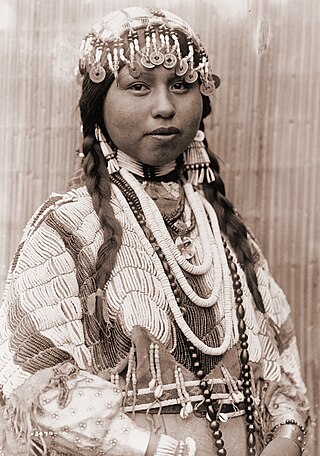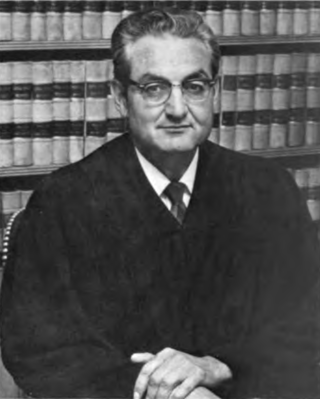
The Yakama are a Native American tribe with nearly 10,851 members, based primarily in eastern Washington state.

Tribal sovereignty in the United States is the concept of the inherent authority of indigenous tribes to govern themselves within the borders of the United States.

United States v. Washington, 384 F. Supp. 312, aff'd, 520 F.2d 676, commonly known as the Boldt Decision, was a legal case in 1974 heard in the U.S. District Court for the Western District of Washington and the U.S. Court of Appeals for the Ninth Circuit. The case re-affirmed the rights of American Indian tribes in the state of Washington to co-manage and continue to harvest salmon and other fish under the terms of various treaties with the U.S. government. The tribes ceded their land to the United States but reserved the right to fish as they always had. This included their traditional locations off the designated reservations.

Celilo Falls was a tribal fishing area on the Columbia River, just east of the Cascade Mountains, on what is today the border between the U.S. states of Oregon and Washington. The name refers to a series of cascades and waterfalls on the river, as well as to the native settlements and trading villages that existed there in various configurations for 15,000 years. Celilo was the oldest continuously inhabited community on the North American continent until 1957, when the falls and nearby settlements were submerged by the construction of The Dalles Dam. In 2019, there were calls by tribal leaders to restore the falls.

The Yakima War (1855–1858), also referred to as the Yakima Native American War of 1855 or the Plateau War, was a conflict between the United States and the Yakama, a Sahaptian-speaking people of the Northwest Plateau, then part of Washington Territory, and the tribal allies of each. It primarily took place in the southern interior of present-day Washington. Isolated battles in western Washington and the northern Inland Empire were sometimes separately referred to as the Puget Sound War and the Palouse War, respectively.
Gonzales v. Oregon, 546 U.S. 243 (2006), was a landmark decision of the US Supreme Court which ruled that the United States Attorney General cannot enforce the federal Controlled Substances Act against physicians who prescribed drugs, in compliance with Oregon state law, to terminally ill patients seeking to end their lives, commonly referred to as assisted suicide. It was the first major case heard by the Roberts Court under the new Chief Justice of the United States.

The Klickitat are a Native American tribe of the Pacific Northwest. Today most Klickitat are enrolled in the federally recognized Confederated Tribes and Bands of the Yakama Nation, some are also part of the Confederated Tribes of the Grand Ronde Community of Oregon.

Wasco-Wishram are two closely related Chinook Indian tribes from the Columbia River in Oregon. Today the tribes are part of the Confederated Tribes of Warm Springs living in the Warm Springs Indian Reservation in Oregon and Confederated Tribes and Bands of the Yakama Nation living in the Yakama Indian Reservation in Washington.
United States v. Oregon may refer to:
United States v. Winans, 198 U.S. 371 (1905), was a U.S. Supreme Court case that held that the Treaty with the Yakima of 1855, negotiated and signed at the Walla Walla Council of 1855, as well as treaties similar to it, protected the Indians' rights to fishing, hunting and other privileges.

Robert Clinton Belloni was a United States district judge of the United States District Court for the District of Oregon. He was instrumental in upholding Native American fishing rights in the Pacific Northwest.
James Alger Fee was a United States circuit judge of the United States Court of Appeals for the Ninth Circuit and previously was a United States district judge of the United States District Court for the District of Oregon. A veteran of the United States Army, his first judicial position was with the Oregon Circuit Court. While a federal judge he made national news for his decision during World War II regarding the application of the exclusion orders that had forced those of Japanese heritage from the West Coast.
United States v. Nice, 241 U.S. 591 (1916), is a United States Supreme Court decision which declared that Congress still retains plenary power to protect Native American interests when Native Americans are granted citizenship. United States v. Nice overruled the Heff decision which declared that Native Americans granted citizenship by the Dawes Act were also then citizens of the state in which they resided, meaning the sale of alcohol to such Native Americans was not subject to Congress's authority.
Menominee Tribe v. United States, 391 U.S. 404 (1968), is a case in which the Supreme Court ruled that the Menominee Indian Tribe kept their historical hunting and fishing rights even after the federal government ceased to recognize the tribe. It was a landmark decision in Native American case law.
Oregon Department of Fish and Wildlife v. Klamath Indian Tribe, 473 U.S. 753 (1985), was a case appealed to the US Supreme Court by the Oregon Department of Fish and Wildlife. The Supreme Court reversed the previous decisions in the District Court and the Court of Appeals stating that the exclusive right to hunt, fish, and gather roots, berries, and seeds on the lands reserved to the Klamath Tribe by the 1864 Treaty was not intended to survive as a special right to be free of state regulation in the ceded lands that were outside the reservation after the 1901 Agreement.
Lavina Washines was the first female leader of the Yakama Nation, Washington, United States.
Idaho v. United States, 533 U.S. 262 (2001), was a United States Supreme Court case in which the Court held that the United States, not the state of Idaho, held title to lands submerged under Lake Coeur d'Alene and the St. Joe River, and that the land was held in trust for the Coeur d'Alene Tribe as part of its reservation, and in recognition of the importance of traditional tribal uses of these areas for basic food and other needs.
The Fish Wars were a series of civil disobedience protests in the pacific northwest during the 1960s and '70s in which Native American tribes around the Puget Sound pressured the U.S. government to recognize fishing rights granted by the Treaty of Medicine Creek. They protested by continuing to fish on their land while risking charges being pressed against them.
The Columbia River Inter-Tribal Fish Commission (CRITFC) is a fishery resource for the treaty tribes of the Columbia River. Under the treaty, the native tribes, The Nez Perce Tribe, Warm Springs Reservation Tribe, and Umatilla Indian Reservation Tribe, have to the right to fish in the Columbia River, which means their fishery must be reserve and protect.

Richard Barry Sobol was an American lawyer who specialized in civil rights law. He worked primarily on desegregation cases in Louisiana.










